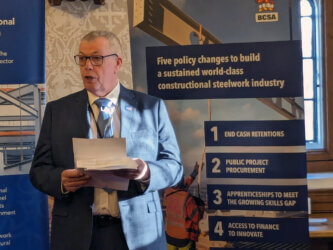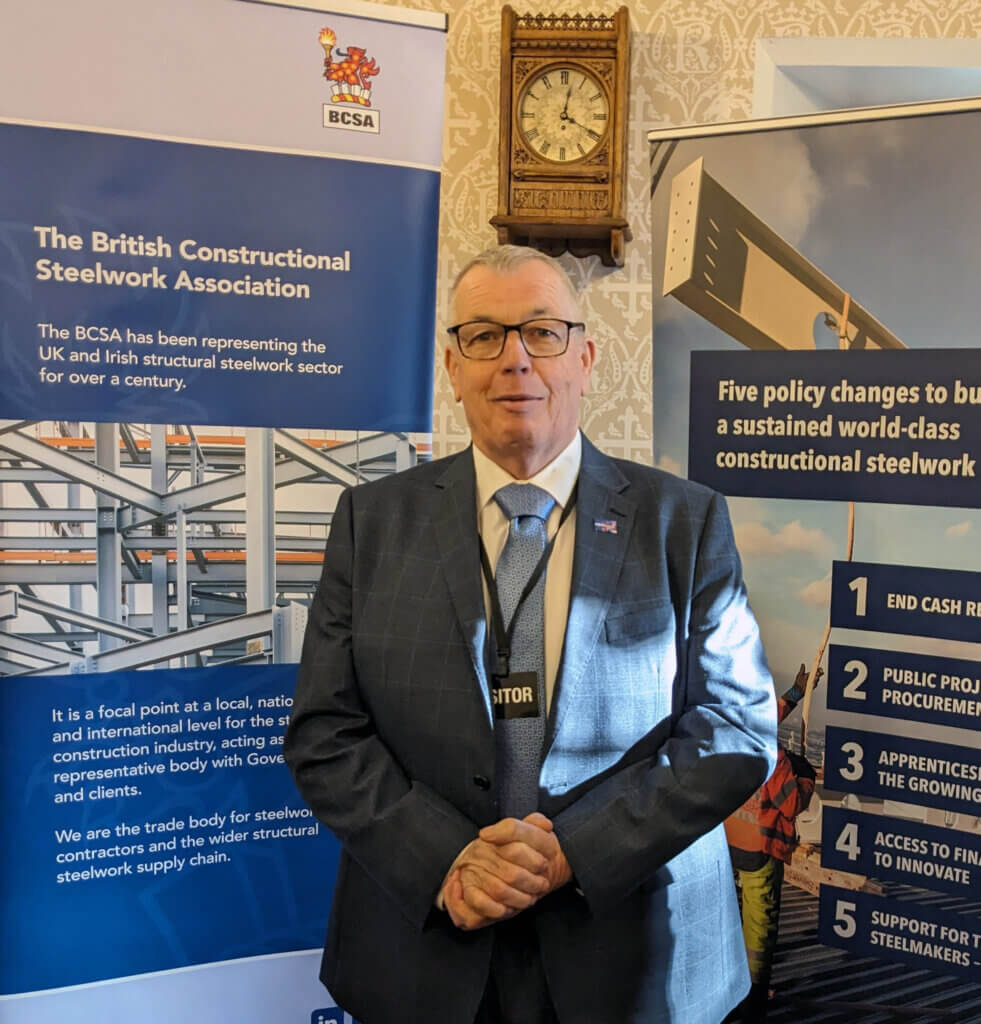 REIDsteel managing director Simon Boyd has called for greater financial backing for the structural steel sector at a manifesto launch at Parliament.
REIDsteel managing director Simon Boyd has called for greater financial backing for the structural steel sector at a manifesto launch at Parliament.
Simon demanded government deal with the difficulties businesses face in seeking access to finance at the British Constructional Steelwork Association (BCSA) event in London.
The BCSA, which is the trade body for UK and Irish steelwork contractors and its wider supply chain, held the summit at the House of Lords to set out five key measures vital to sustain and promote its members and the industry.
The UK constructional steelwork sector is worth approximately £1.6 billion per year and employs around 60,000 people.
Simon was among the speakers urging politicians to take action.
He said: “The focus of government over financial institutions and big businesses needs to be adjusted to see the potential for UK plc through the many SMEs who provide most of the employment in this country.
“We need government to facilitate access to finance so that we can vastly improve our productivity and the pay packet of our people.
“This could be done by government making regulatory changes to the banking world or by giving the British Business Bank or LEPs the financial firepower to provide appropriate loans direct to SMEs.”
He added: “As the Jobs Foundation states, business is a force for good, it lifts people out of poverty, enables social mobility and creates the wealth that allows government to pay for the services our country needs.”
The BCSA’s manifesto launch came as political parties begin to formulise policies for the general election later this year.
Its five measures are:
- End cash retentions
- Public project procurement
- Fit for purpose apprenticeships to meet the growing skills gap
- Access to finance to innovate
- Support for the steelmakers – UK first
Dr David Moore, CEO of the BCSA, said, “The UK steelwork sector is, literally and figuratively, an economic building block. It is both the fabric of our growth and development, and has the potential to be a booming industry creating jobs, boosting GDP and delivering opportunity.
“The industry does not operate in a vacuum and there are simple measures that our politicians could take, which would be a real shot in the arm for our sector.
“It is our hope that a future government, of whatever political persuasion they may be, will recognise both the value and potential of the constructional steelwork industry and take the action we need to flourish and grow.”
REIDsteel, which employs more than 130 people, designs, manufactures and builds steel structures of all kinds, including bridges, hangars, stadia and commercial structures. It has exported to more than 140 countries to date in 105 years of trading.
It has multi-million pound plans for the redevelopment of its facility in Christchurch, Dorset, which have the potential to deliver a 300% increase in productivity over five years delivering a 10% to 15% return on investment for the exchequer through increased tax take.

Mr Boyd reminded government that it is businesses like REIDsteel which create employment, enable social mobility and pay the taxes that government needs to spend on services.
He said: “Give us the access to finance we need and we will improve productivity and level up.”
Mr Boyd is a longstanding champion of the structural steel sector and SMEs, and has campaigned on important issues such as Brexit and poorly thought out directives and regulations.
BCSA manifesto in full:
- End cash retentions
- Cash retentions are monies held in case of a building defect. Sometimes these are not released until the end of the project, which could be years from when our members completed their element of the job.
- They stifle cashflow for companies who could be investing in growth, increasing outputs and contributing further to the economy.
- Retentions damage smaller businesses in the supply chain.
- Ensure all rules are followed and project bank accounts are used on all public projects.
- Public project procurement
- Ensure UK companies are prioritised on all public funded contracts such as HS2, which will spur the economy and boost national social value chains.
- Ensure social value assessments in the procurement process are cascaded down the entire supply chain, not just tier one contractors.
- Ensure the Government Procurement Policy is monitored throughout the supply chain.
- Fit for purpose apprenticeships to meet the growing skills gap
- Jobs in the constructional steelwork industry are relatively highly paid but relatively low-skilled. Further education colleges and apprenticeship providers are given a perverse financial incentive to prioritise level 3 over level 2 apprenticeships, even though there is more demand for the former.
- Work with the industry to develop a fit for purpose apprenticeship scheme, which is appropriately funded.
- Access to finance to innovate
- For the UK Government to see an increase in productivity, companies need access to finance, to enable investment in the latest technology, manufacturing equipment and techniques.
- Encourage Government Departments and financial institutions to support steelwork contracting companies so that they can deliver the increase in productivity we need.
- Support for the steelmakers – UK first
- Without Government support for steelmakers to decarbonise and invest in decarbonisation technologies, more steel will have to be procured from overseas to meet net-zero commitments.
- Commitment to extend the national grid to provide the power for electric arc furnaces in the UK.





